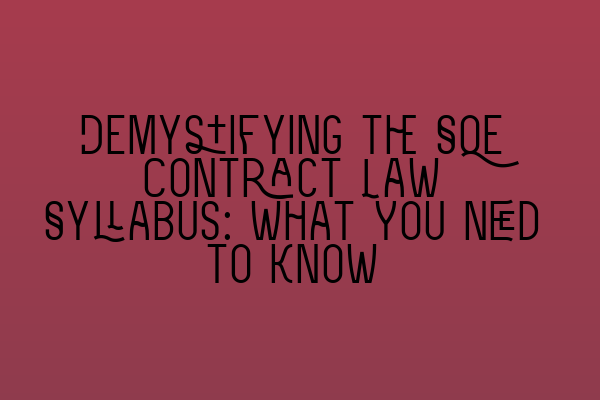Demystifying the SQE Contract Law Syllabus: What You Need to Know
Are you preparing for the Solicitors Qualifying Examination (SQE) and feeling overwhelmed by the Contract Law syllabus? Don’t worry, you’re not alone. Contract Law is a crucial area of study for aspiring solicitors, and understanding its key principles is essential for success in the SQE. In this article, we will demystify the SQE Contract Law syllabus, providing you with the information you need to excel in this subject.
Understanding the SQE Contract Law Syllabus
The SQE Contract Law syllabus covers a wide range of topics related to contracts and contractual agreements. It encompasses both the general principles of contract law and specific areas such as formation of contracts, terms and interpretation, vitiating factors, discharge of contracts, and remedies for breach of contract.
It’s important to note that the SQE syllabus is comprehensive and requires a solid understanding of legal principles, key case law, and statutory provisions. To effectively prepare for this examination, it is vital to break down the syllabus into manageable sections and tackle each topic systematically.
Key Topics in the SQE Contract Law Syllabus
Let’s now take a closer look at some of the key topics you can expect to encounter in the SQE Contract Law syllabus:
1. Formation of Contracts
Understanding how contracts are formed is fundamental to contract law. This topic includes the essential elements required for contract formation, such as offer and acceptance, intention to create legal relations, and consideration.
2. Terms and Interpretation
Contract terms determine the rights and obligations of the parties involved. This topic covers the different types of terms, including express and implied terms, conditions and warranties, and the rules of contract interpretation.
3. Vitiating Factors
Vitiating factors refer to circumstances that can render a contract void or voidable. These factors can include misrepresentation, mistake, duress, undue influence, and illegality. Understanding how these factors operate is crucial for identifying when a contract may be set aside.
4. Discharge of Contracts
Contracts can be discharged in various ways, including performance, agreement, breach, frustration, and operation of law. This topic explores each method of discharge and the legal consequences that follow.
5. Remedies for Breach of Contract
When a contract is breached, the innocent party may be entitled to certain remedies. This topic delves into the types of remedies available, including damages, specific performance, injunctions, and restitution.
Effective Study Strategies for SQE Contract Law
As the SQE Contract Law syllabus is extensive, adopting effective study strategies is crucial for success. Here are some tips to maximize your preparation:
1. Utilize Top Resources for SQE Preparation
Make use of top resources that have been specifically designed for SQE contract law preparation. These resources can provide you with comprehensive study materials, practice questions, and mock exams to test your knowledge and understanding.
To get started, check out this article on Top Resources for SQE Preparation: Tools to Help You Succeed for a list of recommended tools.
2. Attend SQE Mock Debrief Sessions
Mock exams are an excellent way to gauge your preparedness for the SQE. After taking a mock exam, it’s essential to analyze your performance to identify areas of weakness and improve your understanding.
To learn more about how to analyze your performance in SQE mock exams, read this insightful article on SQE Mock Debrief Sessions: Analyzing Your Performance for Growth.
3. Practice with SQE Answer Keys
Answer keys for SQE mock exams can be invaluable in unraveling the mystery of correct answers. By comparing your responses to the model answers provided, you can gain a better understanding of the reasoning and approach required to tackle the exam questions effectively.
For more information on the importance of answer keys in SQE preparation, check out this article on SQE Answer Keys: Unraveling the Mystery of Correct Answers.
Conclusion
Contract Law is a vital area of study for aspiring solicitors, and a solid understanding of the SQE Contract Law syllabus is essential for success in the examination. By breaking down the syllabus into manageable sections, utilizing top resources, and analyzing your performance through mock exams and answer keys, you can effectively prepare and enhance your chances of achieving excellent results in the SQE.
To learn more about the SQE and what you need to know about this qualification, read our comprehensive article on Unveiling the Solicitors Qualifying Examination (SQE): What You Need to Know.
